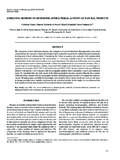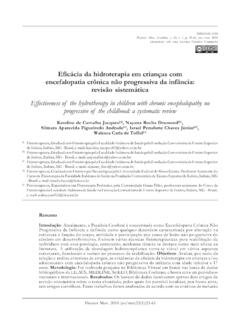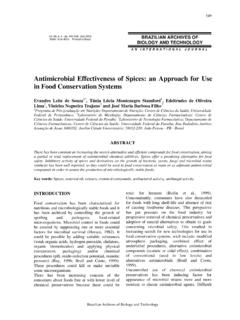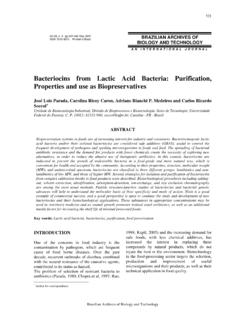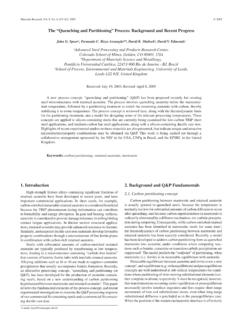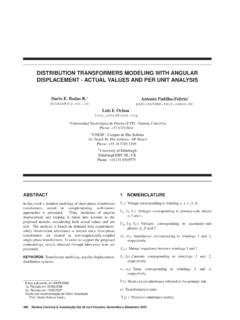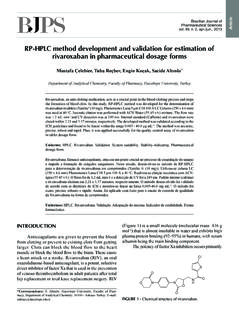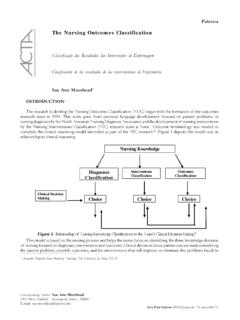Transcription of Cognitive therapy: foundations, conceptual models ...
1 Rev Bras Psiquiatr. 2008;30(Suppl II):S54-64 Cognitive therapy : foundations , conceptual models , applications and researchFundamentos, modelos conceituais, aplica es e pesquisa da terapia cognitiva AbstractObjective: There is growing interest in the Cognitive model of psychotherapy stimulated by an extensive body of research findings demonstrating its effectiveness for a varied set of psychiatric disorders and medical conditions. This review article aims to give an overview of the historical and philosophical background to contemporary Cognitive and Cognitive - behavioral approaches to psychotherapy, pointing out similarities across and differences between them. A presentation of the Cognitive model as designed by Aaron Beck, and some of the Cognitive and behavioral techniques used in emotional disorders will be discussed. Outcome studies and meta-analyses contemplating the efficacy of Cognitive and Cognitive - behavioral therapies in various psychological and medical conditions will be briefly depicted.
2 Method: Through review of articles and textbooks, especially the works of Aaron Beck from which this review article has heavily borrowed, the origins and foundations of the Cognitive - behavioral approaches to the treatment of psychiatric and medical conditions are described. Through Medline, the search of randomized controlled trials and meta-analyses has pointed out the evidence-based efficacy of this psychotherapeutic approach. Results and Conclusions: Cognitive - behavioral therapies in general and Beckian Cognitive therapy in particular hold a theoretical foundation and a varied set of techniques, whose evidence-based efficacy was demonstrated for the treatment of diverse mental and physical conditions. Descriptors: Cognitive therapy ; Behavior therapy ; Review literature; Techniques and procedures; ResearchResumoObjetivo: H um interesse crescente no modelo cognitivo de psicoterapia estimulado por grande n mero de resultados de pesquisa, demonstrando sua efic cia em uma s rie de transtornos psiqui tricos e dist rbios m dicos.
3 Este artigo de revis o objetiva dar um panorama dos fundamentos hist ricos e filos ficos das abordagens cognitivo-comportamentais contempor neas, e apontar similaridades e diferen as entre elas. O modelo cognitivo, conforme delineado por Aaron Beck, e alguns dos procedimentos e t cnicas cognitivas e comportamentais utilizadas em transtornos emocionais ser o apresentados. Ao final, resultados de pesquisas e metan lises em rela o efic cia das terapias cognitivas e cognitivo-comportamentais em v rios transtornos psiqui tricos e dist rbios m dicos ser o relatados brevemente. M todo: Por meio da revis o de artigos e livros-texto, principalmente dos trabalhos de Aaron Beck dos quais foi extra da a presente revis o, foram descritas as origens e os fundamentos das abordagens cognitivo-comportamentais no tratamento dos transtornos psiqui tricos e m dicos. Atrav s de buscas no Medline de ensaios cl nicos randomizados e metan lises, foram apontadas as evid ncias de efic cia dessa modalidade de tratamento psicoter pico.
4 Resultados e Conclus es: As terapias cognitivo-comportamentais em geral, e a terapia cognitiva beckiana em especial, apresentam um fundamento te rico e um conjunto de t cnicas cuja efic cia baseada em evid ncias foi demonstrada no tratamento de diversos quadros mentais e f sicos. Descritores: Terapia cognitiva; Terapia comportamental; Revis o; T cnicas e procedimentos; PesquisasPaulo Knapp,1 Aaron T Beck2,3 CorrespondencePaulo KnappRua Tobias da Silva, 99, sala 40190570-020 Porto Alegre, RS, BrazilE-mail: Psychiatry doctoral student, Universidade Federal do Rio Grande do Sul (UFRGS), Porto Alegre (RS), Brasil2 University of Pennsylvania, Philadelphia (PA), USA 3 Beck Institute for Cognitive therapy , Philadelphia (PA), 543/11/2008 12:38:02 Rev Bras Psiquiatr. 2008;30(Suppl II):S54-64S55 Knapp P & Beck ATIntroductionThe terms Cognitive therapy (CT) and the generic term Cognitive -behavior therapy (CBT) are frequently used as synonyms to describe psychotherapies based on the Cognitive model .
5 The term CBT is also used for a group of techniques in which a Cognitive approach and a set of behavioral procedures are combined. CBT has been used as an umbrella term to include both standard CT and atheoretical combinations of Cognitive and behavioral about 45 years ago, when the role of cognition in depression2 and in therapy3 was first described in the literature, there has been continuing progress in the development of Cognitive theory and therapy . Empirical testing of both has refined the Cognitive model throughout the ,5 The essential features of CT, however, have persisted, in particular the emphasis on the influence of distorted thinking and unrealistic Cognitive appraisals of events on an individual s feelings and Aaron Beck, the founder of Cognitive therapy , formulated a coherent theoretical framework before therapeutic strategies were developed. The guidelines to develop and evaluate the novel system of psychopathology and psychotherapy were:1 1) to construct a comprehensive theory of psychopathology that articulated well with the psychotherapeutic approach; 2) to investigate empirical support for the theory; and 3) to conduct empirical studies that tested the efficacy of the therapy .
6 Research thereafter involved several stages:5 trying to identify the idiosyncratic Cognitive elements derived from clinical data in various disorders; developing and testing measures to systematize these clinical observations; and preparing treatment plans and guidelines for therapy . Research and clinical practice have shown CT to be effective in reducing symptoms and relapse rates, with or without medication, in a wide variety of psychiatric disorders. Beck applied CT s theoretical and therapeutic set of principles systematically to a sequence of disorders starting with depression,4,6 suicide,7 anxiety disorders and phobias,8 panic disorder,9 personality disorders,10 and substance Interpersonal problems12 and anger, hostility, and violence13 were also studied. In addition, more recent work with this approach has shown an additional effect over medication treatment of severe psychiatric disorders such as schizophrenia 14,15 and bipolar ,17 Ongoing adaptations of Cognitive - behavioral protocols for an increasingly wider range of psychological and medical disorders18 have been tested for chronic pain, marital distress, childhood somatic disorders, as well as for bulimia nervosa and overeating There are now over 330 outcome studies on Cognitive - behavioral interventions, and research production has continued.
7 20 A few neuroimaging outcome studies21-23 have recently confirmed what was already thought: CBTs produce physiological and functional changes in many brain sites. Historical and philosophical background to CBTsIn the early 1960s, a Cognitive revolution began to emerge24 although the first major texts on Cognitive modification appeared only in the 1970s. Albert Bandura s25 research on information-processing models and vicarious learning together with empirical evidence in the area of language development26 raised questions about the traditional behavioral model available up to that date, and pointed out the limitations of a non-mediational behavioral approach in explaining human An increasing number of theorists and therapists started to identify themselves as being Cognitive - behavioral in orientation; some of the most important early proponents of a Cognitive and Cognitive - behavioral perspective were Beck,2,4,28 Ellis,29 Cautela,30 Meichenbaum,31 and diversity of CBT approaches have emerged over the decades, reaching varied degrees of application and CBTs can be organized in three major divisions:32 1) coping skills therapies, which stress the development of a repertoire of skills designed to give the patient the instruments to cope with in a variety of problem situations; 2) problem-solving therapies, which emphasize the development of general strategies to deal with a broad range of personal difficulties; and 3) restructuring therapies, which emphasize the assumption that emotional problems are a consequence of maladaptive thoughts, being the goal of treatment to reframe distorted thinking and to promote adaptive thoughts.
8 A few of these conceptual models of Cognitive - behavioral modification, as presented by Dobson and Dozois24 are briefly summarized below. Aaron Beck s Cognitive therapy will be discussed in a separate section in this training was developed in the 1970s by Donald Meichenbaum,33 with a particular focus on the relationship between verbal self-instruction and behavior. Supported by extensive literature, self-instructional training has its emphasis on graded tasks, Cognitive modeling, directed mediational training, and self-reinforcement, which clearly reflects Meichenbaum s behavioral background. Stress inoculation training, another CBT with a multi-component coping-skills approach, was also developed by Meichenbaum,34 and is based on the theoretical premise that in learning to deal with mild levels of stress, clients essentially become inoculated against uncontrollable levels of stress. Problem-solving therapy , conceptualized as self-control training, was proposed in 1971 by D Zurilla and Goldfried;35 its purpose is to train in basic problem-solving skills that are subsequently applied to real problem situations and thus promote generalized behavior change.
9 It has been developed and used in a variety of situations, such as stress prevention and management, anger management, depression, and coping with Rational emotive behavior therapy (REBT), a restructuring therapy developed by Albert Ellis, is regarded by many as one of the first Cognitive - behavioral therapies. Over 45 years ago, Ellis, originally a psychoanalyst, developed the so-called ABC model , which posits that any particular experience or event activates (A) individual beliefs (B), which in turn generate emotional, behavioral or physiological consequences (C). Ellis also postulates that 12 basic irrational beliefs, which take the form of unrealistic or absolutistic expectations, underlie emotional disturbance. The goal of therapy is to identify irrational beliefs, and through logical-empirical questioning, challenging, disputing and debating forcefully modify His 1962 book Reason and Emotion in Psychotherapy remains a primary reference for this therapy has a structural Cognitive approach introduced in the early While there are some parallels between the Cognitive - behavioral and the constructivist perspectives, such as the identification and modification of Cognitive structures through a variety of behavioral and Cognitive techniques, there are important differences between CBT, termed a rational approach, and the constructivist perspective considered as a post-rational Guidano38 expressed increasing concern with the validity value of Cognitive structures over the truth value of the content of Cognitive structures.
10 Rather than dealing with thought content, therapies within constructivism would emphasize the process of thinking and the generation of meaning. As pointed out by Neimeyer39 the post-rational approach may be even radically divergent from a traditional Cognitive therapy perspective . In recent years, many other Cognitive - behavioral approaches have emerged and evolved from the original Cognitive and 553/11/2008 12:38:02 Rev Bras Psiquiatr. 2008;30(Suppl II):S54-64S56 foundations of Cognitive therapybehavioral conceptual model . Schema therapy , developed by Jeffrey Young,40 and Dialectic behavior therapy (DBT) developed by Marsha Linehan,41 are two good examples of CBT approaches being used to treat individuals with more severe psychopathology, particularly borderline personality Similarities and differences between CBTs CBT approaches share common ground, although there are considerable differences in principles and procedures between them for the fact that the pioneers in the development of Cognitive - behavioral interventions came from different theoretical backgrounds.
